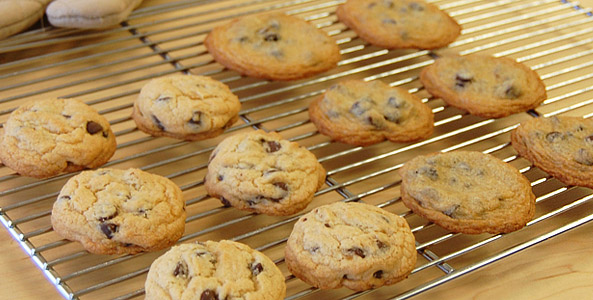

Cookie Know-How: Why Do My Cookies Spread?
Cookies are the most common “from-scratch” recipe made by home bakers so, of course, the top question relates to cookie baking: Why are my cookies spreading?
 by
Land O'Lakes Test Kitchen
by
Land O'Lakes Test Kitchen
 by
Land O'Lakes Test Kitchen
by
Land O'Lakes Test Kitchen

Cookies are the most common “from-scratch” recipe made by home bakers so, of course, the top question relates to cookie baking: Why are my cookies spreading?
Many bakers get frustrated and often find this happens with recipes they have made numerous times. Regardless of how many times a cookie recipe has been made successfully, sometimes it can fail. Cookies may spread too much for a variety of reasons. Here are the top five reasons they may look more like pancakes than cookies and some possible solutions.
1. Dough is too soft. This is because the flour may have been incorrectly measured, the temperature in the kitchen was too warm or the dough has set out too long before baking. If this happens, put the dough into the refrigerator until it is well chilled, usually about 1 to 2 hours. Another possible fix is to add some additional flour, 1 tablespoon at a time, until the dough is slightly stiffer and doesn’t spread.
2. Butter or margarine is too soft. Never soften your butter in the microwave because it can easily be over-softened. Butter should only be softened by letting it stand at room temperature for 30 to 45 minutes. It should indent slightly when you press it with your finger.
3. Cookie sheet is too warm. If you reuse a cookie sheet that has just been taken out of the oven, it is too hot and will cause your cookies to spread. Always use at least two cookie sheets, and always allow them to cool before putting more cookie dough on them.
4. Extra-large rather than large eggs are used. All Land O’Lakes recipes have been developed using large eggs, unless a recipe specifically calls for another size. Extra large eggs add more liquid to the dough and may cause it to be too soft and spread.
5. Greasing a cookie sheet when the recipe does not call for it can cause the cookies to spread excessively and brown too quickly around the edges.
With prime cookie-eating season upon us, you’ll want to make sure your baking efforts are paying off. Follow these suggestions, and you’ll be more likely to beat the spread.
Share Your Thoughts
Did you find this article helpful? Has it inspired you? What else would you like to know?



